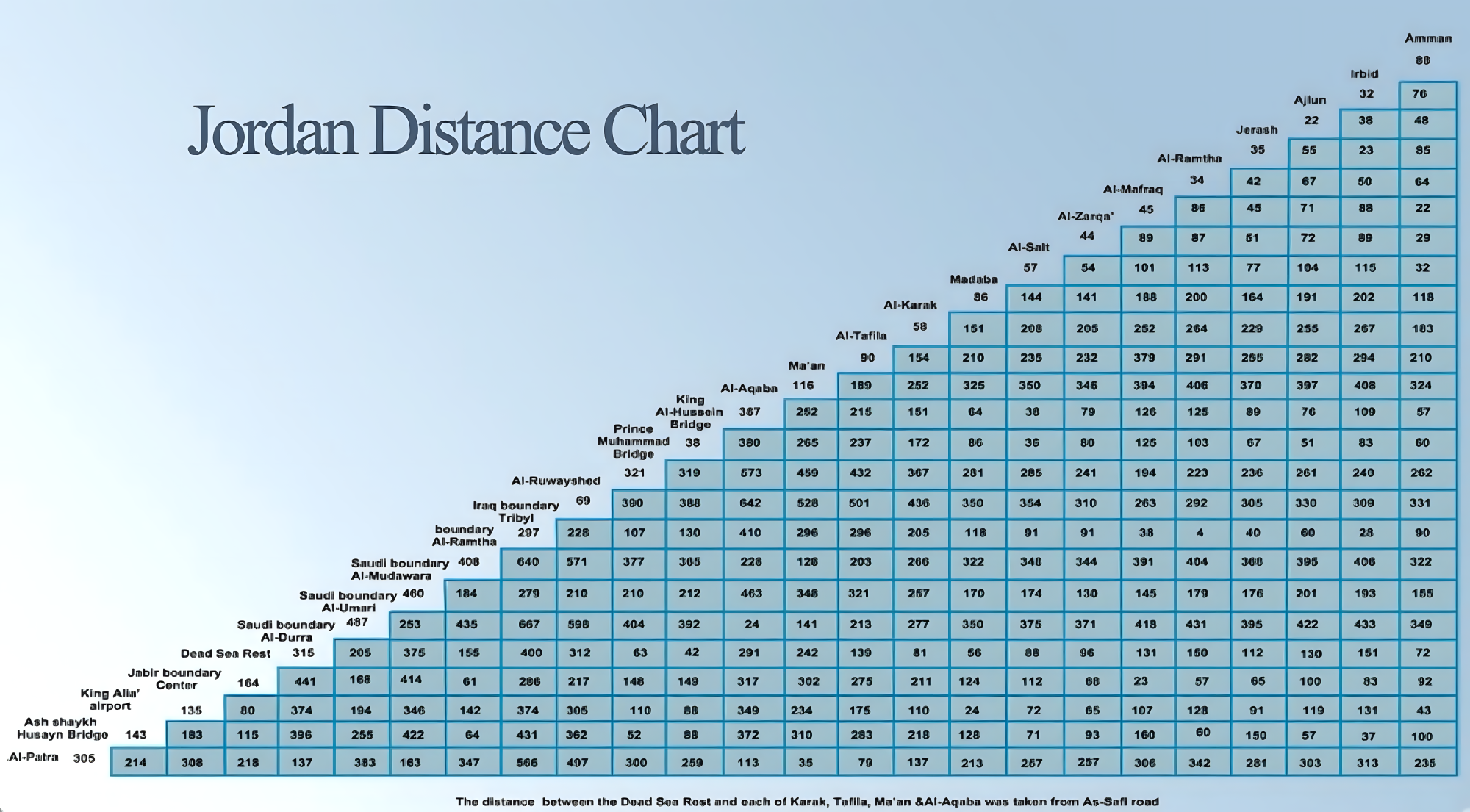General Information
Thing You Need To Know Before Visiting Jordan !
Weather
Jordan is actually a year- round destination, and has a typically Middle Eastern climate. While it is rainy and cold in Amman or Petra, it would be warm and pleasant at the Dead Sea or Aqaba. The visit to Jordan would be surprisingly adequate during Spring and Autumn “Mid- September through mid-November” as the days are normally warm, with temperatures around 26-28C (78-84F), but during the nights, it might be cool. Summers are scorching here in Jordan with a temperatures reaching around or more than 40C (104F). If the heat doesn’t have that big impact for you, it is still worth considering a trip during this time of the year as most of the sites will be quieter and not crowded than other times of the year.
Rain falls from November to March sometimes. Winters would be truly cold and wet, with the possibilities slight of snow sometimes “But it’s common to have snow every year”. The coldest months of the year are December and January, where temperatures average about 13 C degrees, but can drop to around 5 degrees especially during the night. The area which has altitude of 1000 meters and above, there is a chance of snowfall in winter, and apparently few have even had the chance to see Petra (1200 meters above sea level) in the snow.
In the Jordan Valley, around the Dead Sea and in Aqaba on the Red Sea the winters are warm and pleasant in winter time, and very hot during the summer.
The chart below will show you the average high/low temperatures (Celsius) for several popular cities around the country:

Visas
Coming to Jordan whether for business or tourism, needs an entry visa. Single-entry visas can be obtained on arrival at any airport, port or land border except at the King Hussein/ Allenby Bridge, where you must have your Jordanian visa from any Jordanian embassies abroad prior to your arrival at the border crossing. Some nationalities require an entry visas to be obtained in advance. Please check with us for the latest information to see which nationalities require visa clearance.
At present, the Jordanian Government has waived visa fees for all non-restricted nationalities coming through Jordanian tour operators whether travelling individually or in groups. The visa fee is waived on the condition that the traveler/travelers spend a minimum of two consecutive nights in Jordan
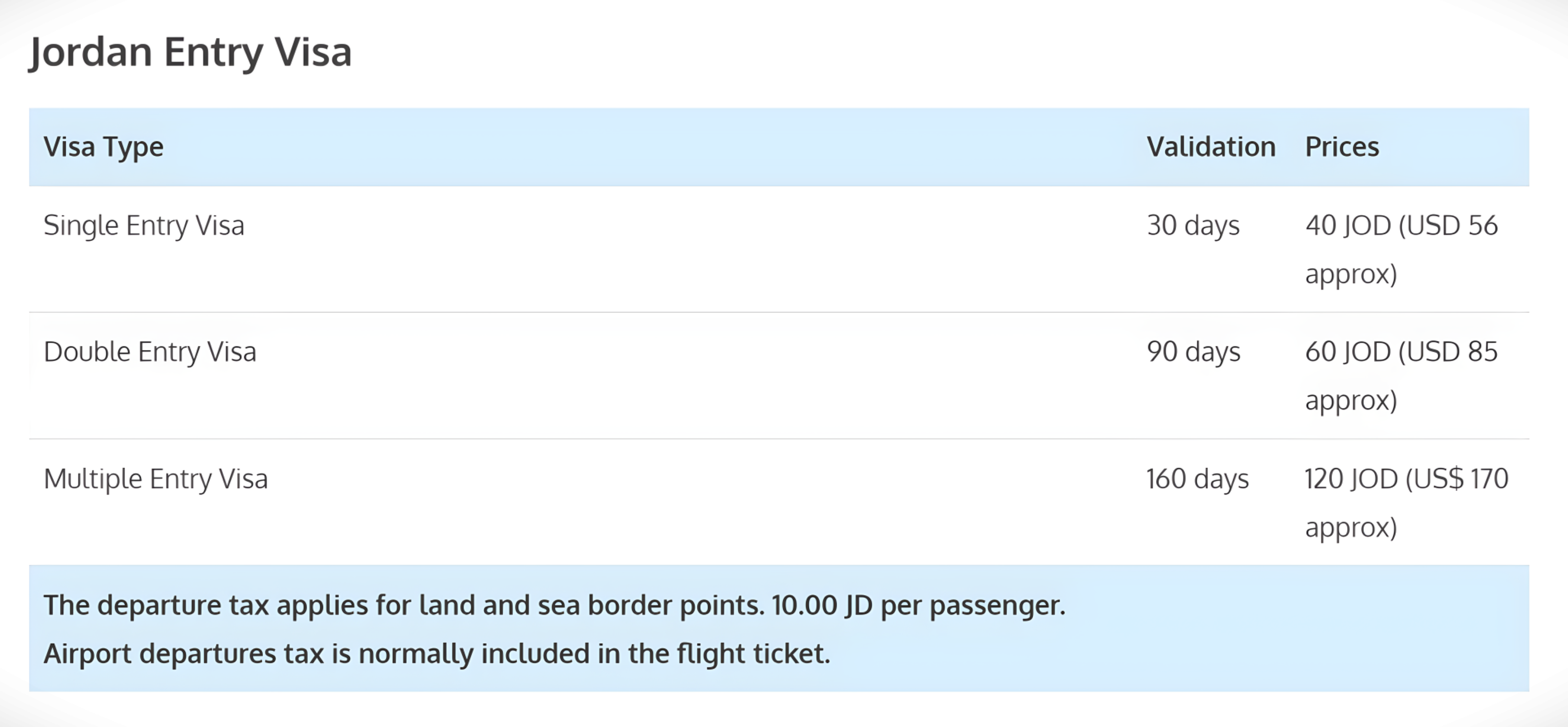
Is It Safe To Travel To Jordan
Jordanian people are very helpful especially in case of emergency, so if you ever need any help! You just need not to hesitate to ask! People travelling to Jordan will not feel unsafe or threatened during their time in Jordan and never got the impression that they were not welcomed here. Part of your visit Jordan might be involving a tourist police to be assigned to travel with tour groups usually. Again, these policemen are there for your protection. Their presence is an added assurance that help is only a short radio-alert away in the event that it should be needed. They will not interfere with the program of your trip, nor with the guide’s performance of his duties. The government of Jordan has long considered your safety its special responsibility, and you are not being charged, either directly or through your tour operator, for this special protective measure.
Least but not last, Jordan alliance with whole world is solid and doesn’t fluctuate with the changes of current crises. We are here in Jordan believe in peace, and we wish that peace will prevail on earth and everyone has a goodwill life.
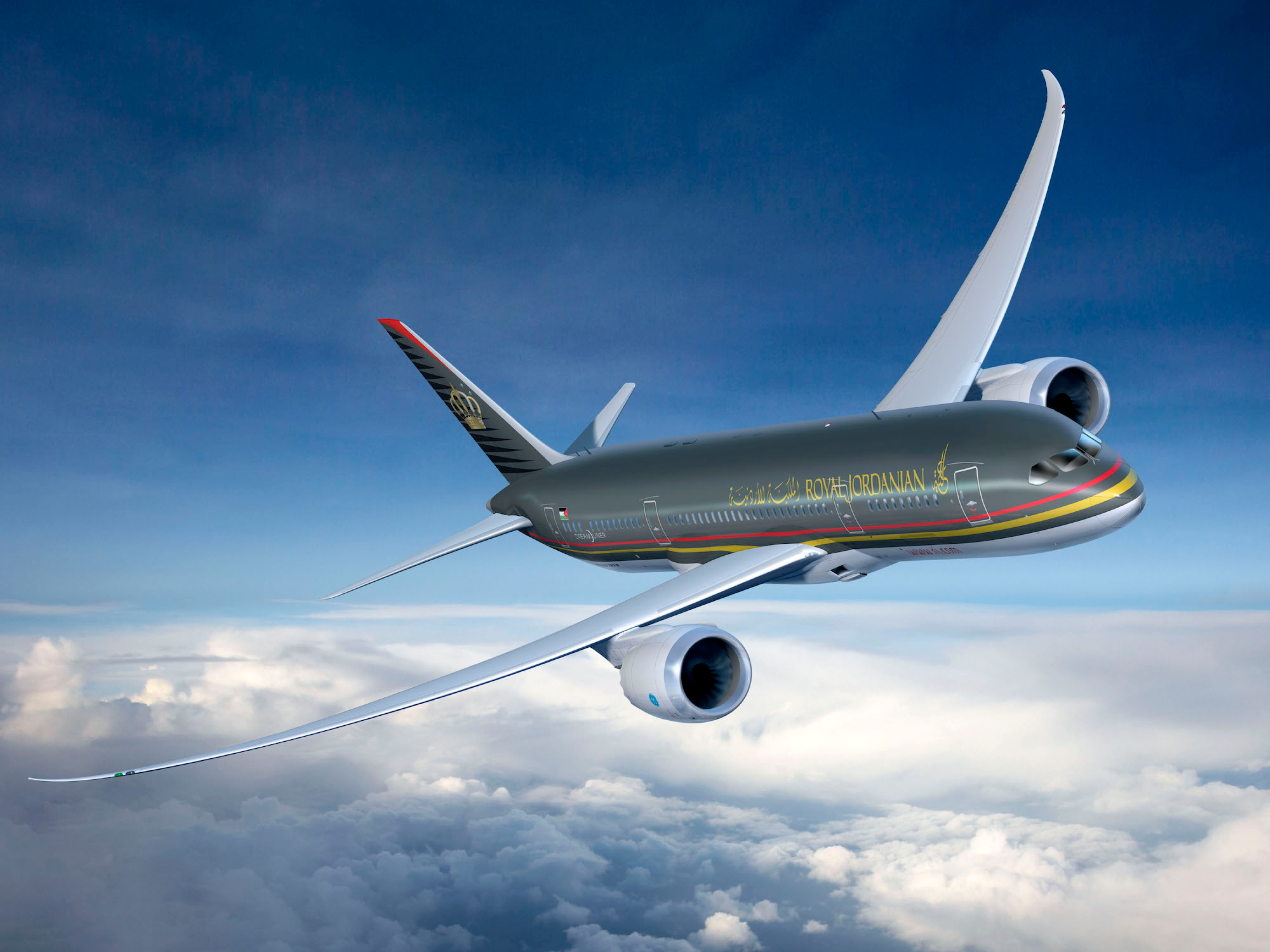
Money In Jordan
The local currency is the Jordanian dinar (JD), which is often called “JD”. The dinar is divided into 100 piaster or “Qurch”, or 100 fils. The paper currency is denominated in 1,5, 10, 20 and 50 dinar notes, and you usually see the prices Witten as 4.750, that is the 4 JD and 750 fils. Coins come in the following denominations: 1, 5, 10, 25, and 50 piasters. It is useful to carry some coins and low denominations (1 JD notes).
The JD is pegged to the US dollar at the official exchange rate of $1 = 0.708 JD. This is the rate you will receive if you exchange dollars to dinars in banks and most currency exchanges. The bank windows at the airport and at land borders charge a small commission for the exchange (around 3%), while ordinary retail banks will give you the official exchange rate, which they have prominently displayed. Hotels will generally charge a 5-8% commission for exchanging currency at their reception desks.
Be aware, however, that you may receive something less than the official exchange rate for these transactions. When you pay for gasoline, shop in regular retail stores and supermarkets, purchase official government tickets for site entry fees and the like, you must pay in Jordanian dinars. Many retail outlets, restaurants and hotels now accept major credit cards, but here again you may be charged a service charge for their use especially in retail outlets. Travelers’ checks are not widely accepted in Jordan, and you will pay a steep penalty for cashing them at banks or currency exchanges.
You will find ATMs outside most banks throughout the country these days. You will also find them at shopping malls, in the airports, on pedestrian malls and in other high- traffic shopping area. Some have cash in advance withdrawal limit of around JD 200 per transaction, but many have much higher amounts available for withdrawal. Be aware that during long (4- day) Eid Holidays, some ATMs will run out of cash
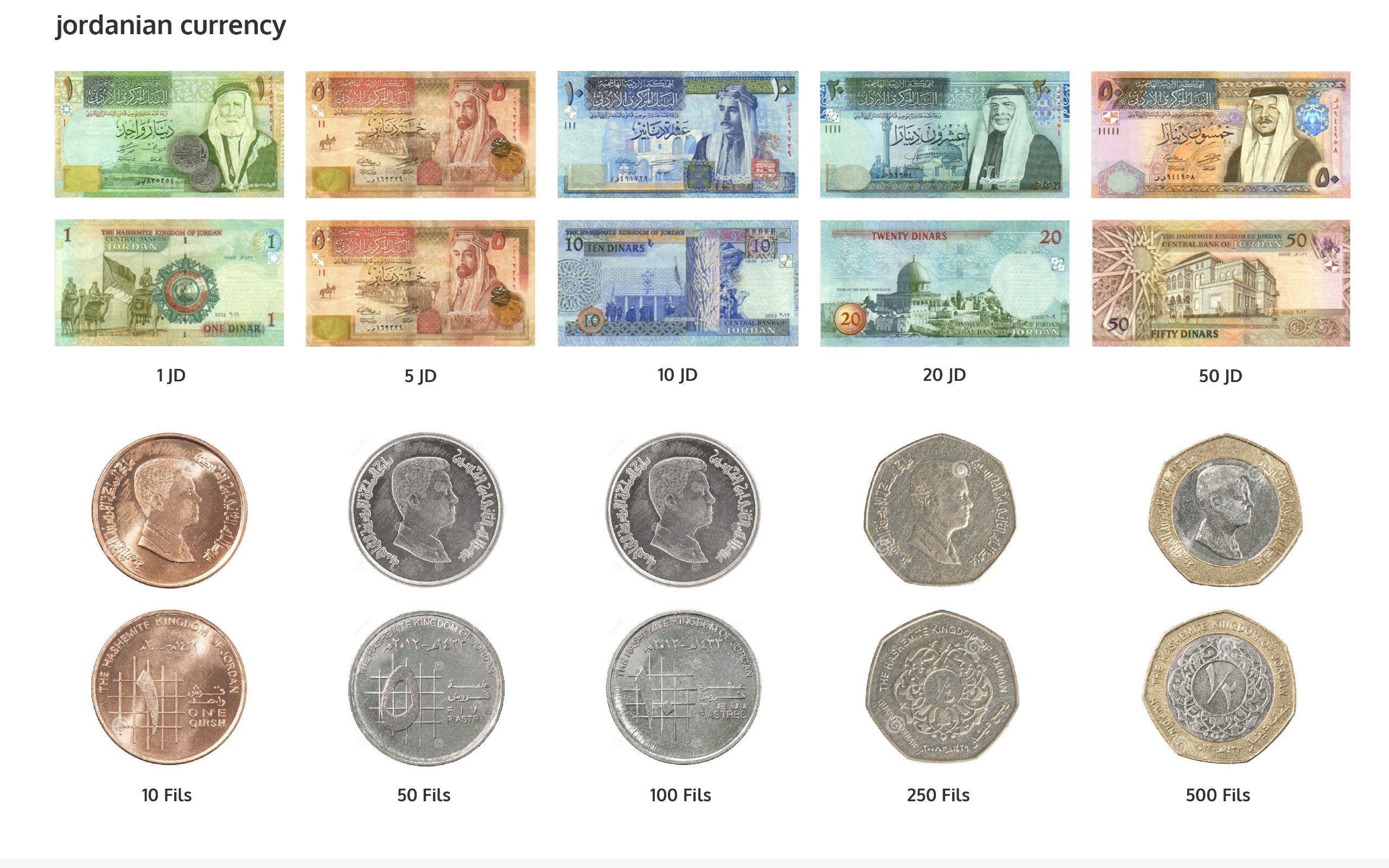
Language
When Arabic is written in Jordan using the Latin alphabet, English spelling is applied however these spellings can be interpreted in various ways, the spelling for example of street addresses can vary widely. For this reason, the sound of the words is a much better guide than the spelling.
Speaking Arabic is easier than you might think and attempting a few basic words will gain you respect from the locals and is a good way to break the ice. The Jordanian people are very understanding and will help you whenever they are able.

What Is Ramadan
The month is also a time for spiritual reflection, prayer, doing good deeds and spending time with family and friends. The fasting is intended to help teach Muslims self-discipline, self-restraint and generosity. It also reminds them of the suffering of the poor, who may rarely get to eat well.
The time of Ramadan changes every year, and it is determined by the Islamic Lunar calendar, as the Islamic Lunar calendar is 11- 12 days shorter than the Gregorian calendar. The exact date of Ramadan is marked by the new moon, and it is only announced on television the night before by the Mufti (State religious Advisor, appointed by the government). Restaurant choices will be limited during Ramadan, as all local restaurants and street vendors close for the entire holy month of Ramadan. You need to check with your guide or driver to look for those restaurants that cater for tourist market, as they are the only ones open during the daylight hours. There are some restaurants only offer a special Iftar meal, which is the “breakfast” meal served at sundown. Public shops remove all alcoholic products from their shelves during the month of Ramadan. However, many major hotels “Especially the 5 star hotels”, alcohol will be served during Ramadan only in special enclosed areas rather than in the public lobbies or restaurants.
If you’re visiting Jordan during Ramadan, you’ll want to keep in mind that Non-Muslims are not expected to adhere to the fasting, but your driver, your guide, your waiter and other service providers may be fasting. They do not expect your sympathy, but it would nice of you to have good manners during the month by not to smoke, eat or drink in public areas. Modest standard of dress would be appropriate throughout Ramadan as well. Bear in mind that your tour guide or driver would be fasting, and they will be eager to conclude your tour and take you to your hotel in time, so they can be at home with their family before Iftar time, and they might invite you to join them!
There are many interesting and enjoyable aspects to visiting a Muslim country during Ramadan. Many hotels and restaurants offer special “Ramadan Nights Programs”, with special areas decorated in a traditional Oriental style and offering plays, musical entertainment, story tellers and other entertainments. Many shops re-open a couple of hours after the Iftar and stay open late into the night; in the downtown shopping areas a festive holiday air is apparent. Many Jordanians will gather in public “Ramadan tents” to enjoy all-night card games and special Ramadan pastries and drinks. There are special sweets and drinks which are only prepared during Ramadan. Grasp this chance to take advantage of this opportunity to test these seasonal delights.
Muslims during Ramadan greet each other by saying “Ramadan Kareem” which is the proper meaning of “Generous Ramadan”, but this is actually an additional thing we add with Ramadan to show its Sacredness. At the end of the month, you can say “Eid Mubarak” which means Happy Eid.
Traveling in Jordan during Ramadan would be a great experience. It is a chance to experience the true hospitality, generosity, and kindness that this holy month of Ramadan impacts people.
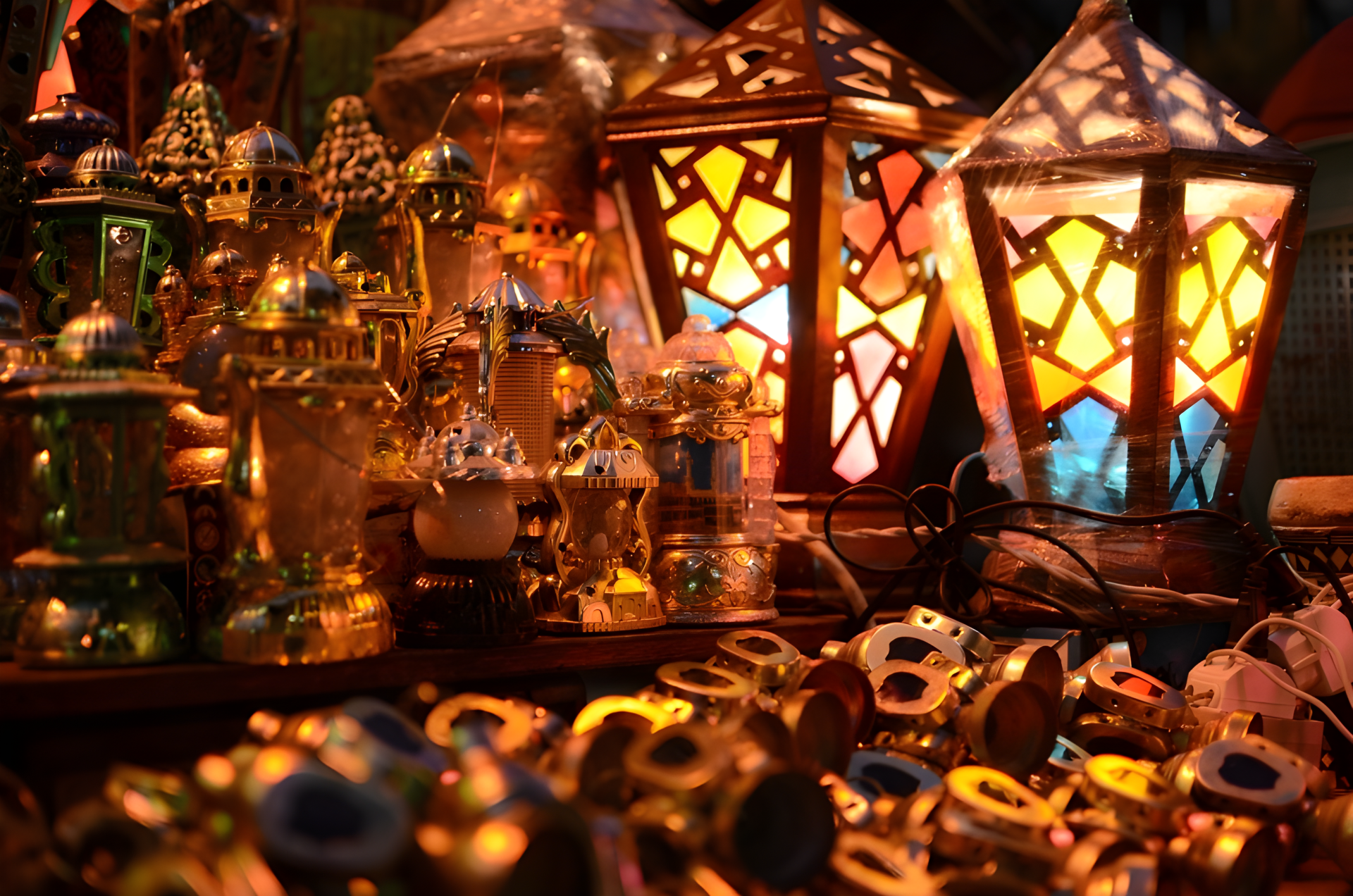
Shopping
For a simple and useful gift such as handmade soap, candle-making, Cold-pressed olive oil, dried organically grown herbs, spices, and fruits are good choices to take into consideration among a few of the Kingdom’s many agricultural treasures worth seeking out.
There are some certain part of Jordan are knows for specific crafts. Petra is famous for its authentic sand bottle, Madaba for its unique mosaics which prepared by craftsmen trained to restore the ancient monuments and to create contemporary artistic statements. Jerash is famous for its carpets, and handmade culinary needs such as organic olive oil, and dried fruits. In rural areas, local women are somehow relying for a tiny income from making colorful embroidery, rugs weaving that display tribal affiliations and family status where traditional skills are passed down from generation to generation.
Care products made from the unique mineral of the Dead Sea are varied and can founded throughout the country, but bear in mind that Jordanian buy these product a well! So for a best deal and cheapest price you can get, you better check the local pharmacies and supermarkets. There was a national strategy to tourism handicraft with several NGOs to provide new sources of income for in rural areas that have few other employment opportunities. The Jordan River Foundation, Royal Society for the Conservation for Nature, and Noor Al- Hussein Foundation established to help local people in rural areas to establish handicrafts workshops to provide needed income as well as to spread out the benefits of tourism throughout the country. Many of the women originally trained by these projects have managed to established successful businesses themselves. If you are traveling during the summer from June to August, do not miss the chance to wander around Souq Jara in Amman. It is an outdoor market for crafts and antiques located in the old neighborhood of Jabal Amman, right in the hearty of the city at Rainbow Street. Souq Jara is well worth a visit to see the different kinds of art crafts and the mixed crowd that gathers every Friday at one of the Amman favorite markets.
Before you buy any Jordanian handicrafts, make sure to question the shopkeeper about the provenance of the items to be sure that you are getting locally produced items.
A final word of advice… Bargaining in Jordan is a basic manner of tradition while shopping in Jordan and it can be an exciting shopping experience. Bargain is acceptable, but not always necessary, especially on low prices items. Some shops, especially those offering workshops and social- development products are fixed price shops. If not, you will have a protracted and enjoyable negotiation over a glass of mint tea offered by shopkeepers. Shops which offer to ships goods around the world, “free of charge” have already factored this into their price structure.
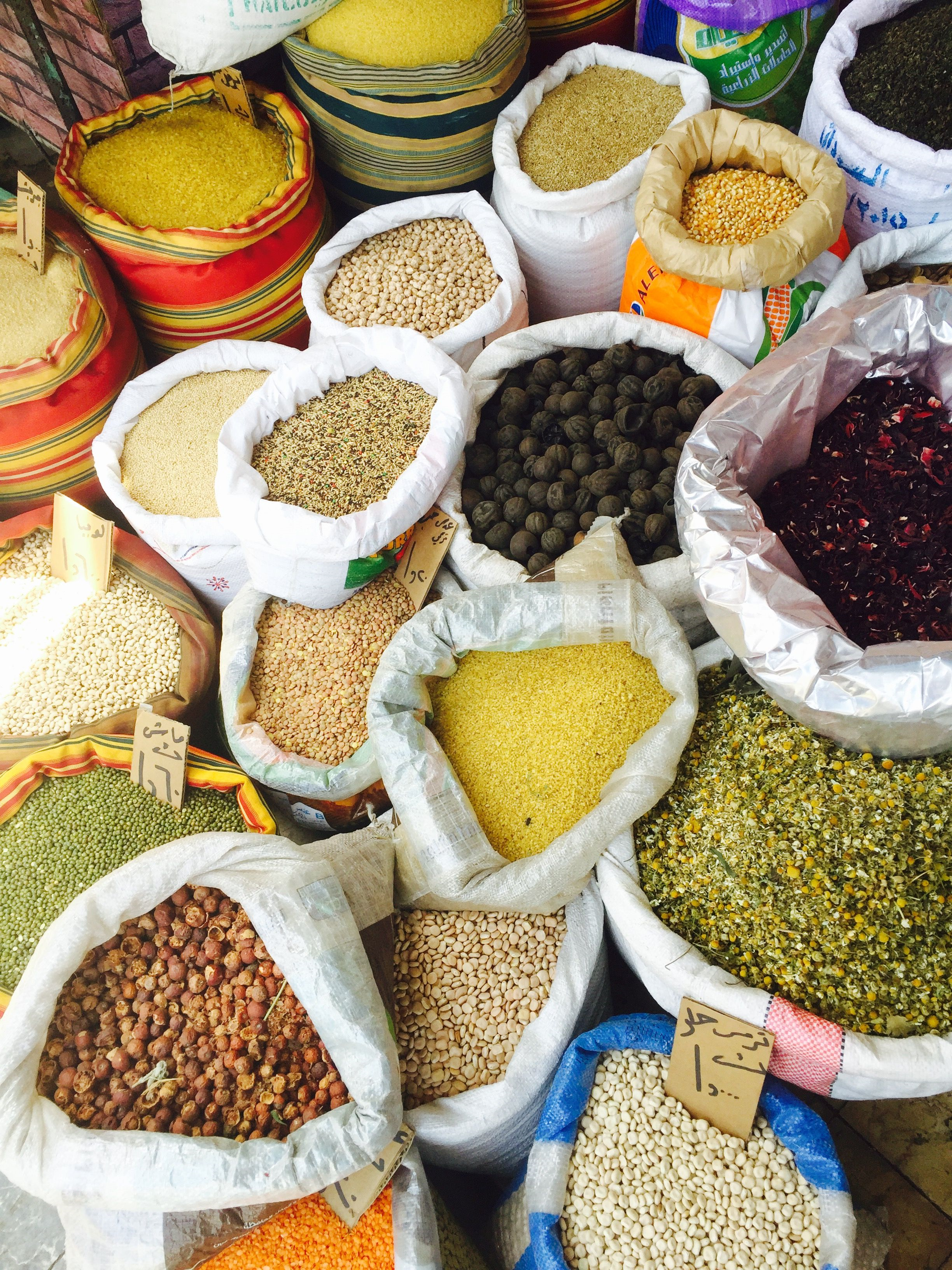
Time
in March, and change back the last Thursday night in October). That means we are two hours ahead of London, and seven hours ahead of New York.

Voltage
Most of the electrical shops in Jordan sells varieties of adapters and transformers, besides laptops and mobiles phones chargers are widely available at the shops throughout Jordan.
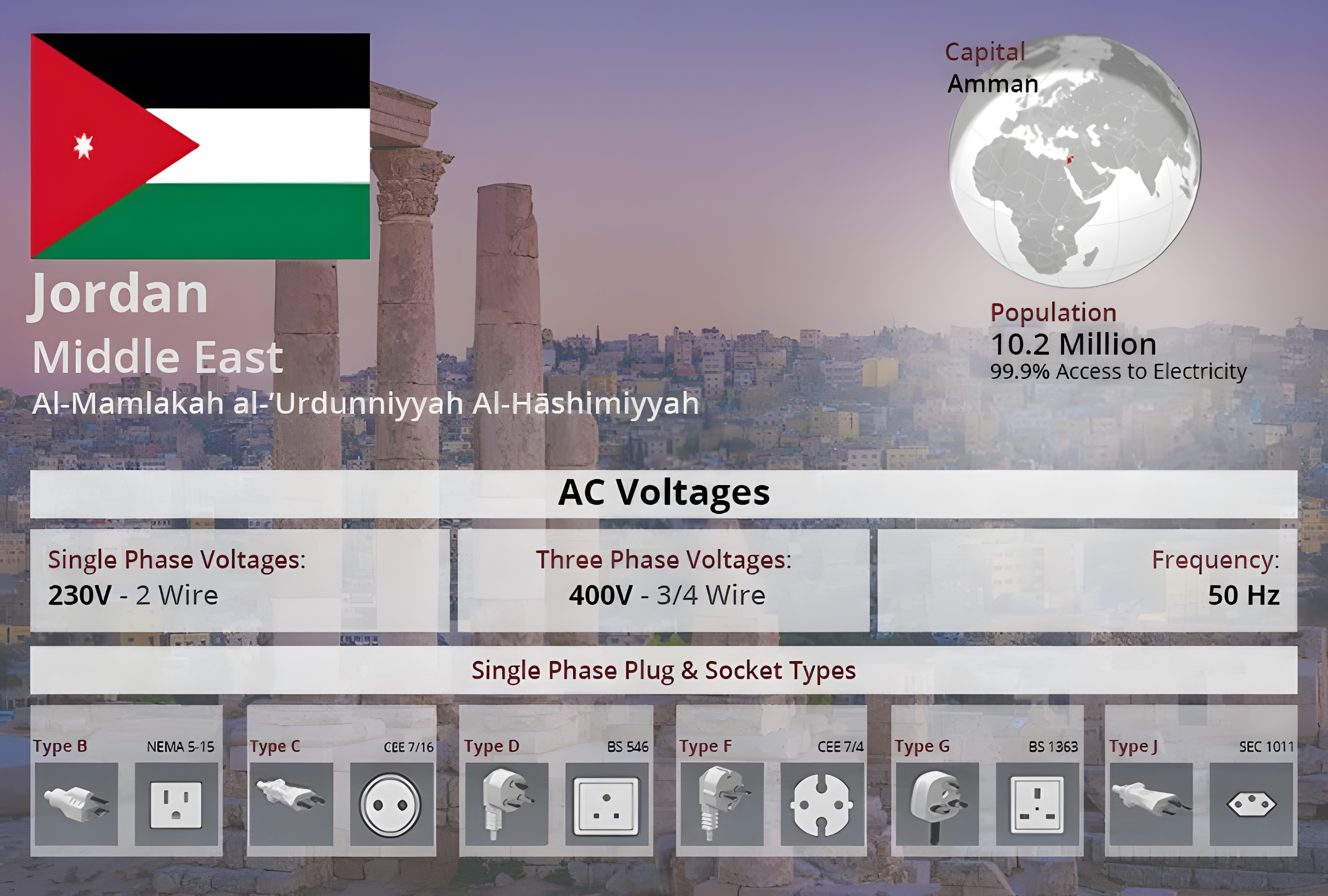
Help
The below table will show you the local emergency contact numbers, so you can get in touch in case of emergency. To inquire about a telephone number call the post office information number, 1212. To report other problems related to your visit, you can call the Ministry of Tourism’s Tourist Police hotline at 117777.
Most rental car agencies will provide you with a 24-hour emergency number to use in the event of breakdowns or accidents.
While planning your trip, ask your Jordanian tour operator to provide you with their own 24-hour emergency number to use as needed.
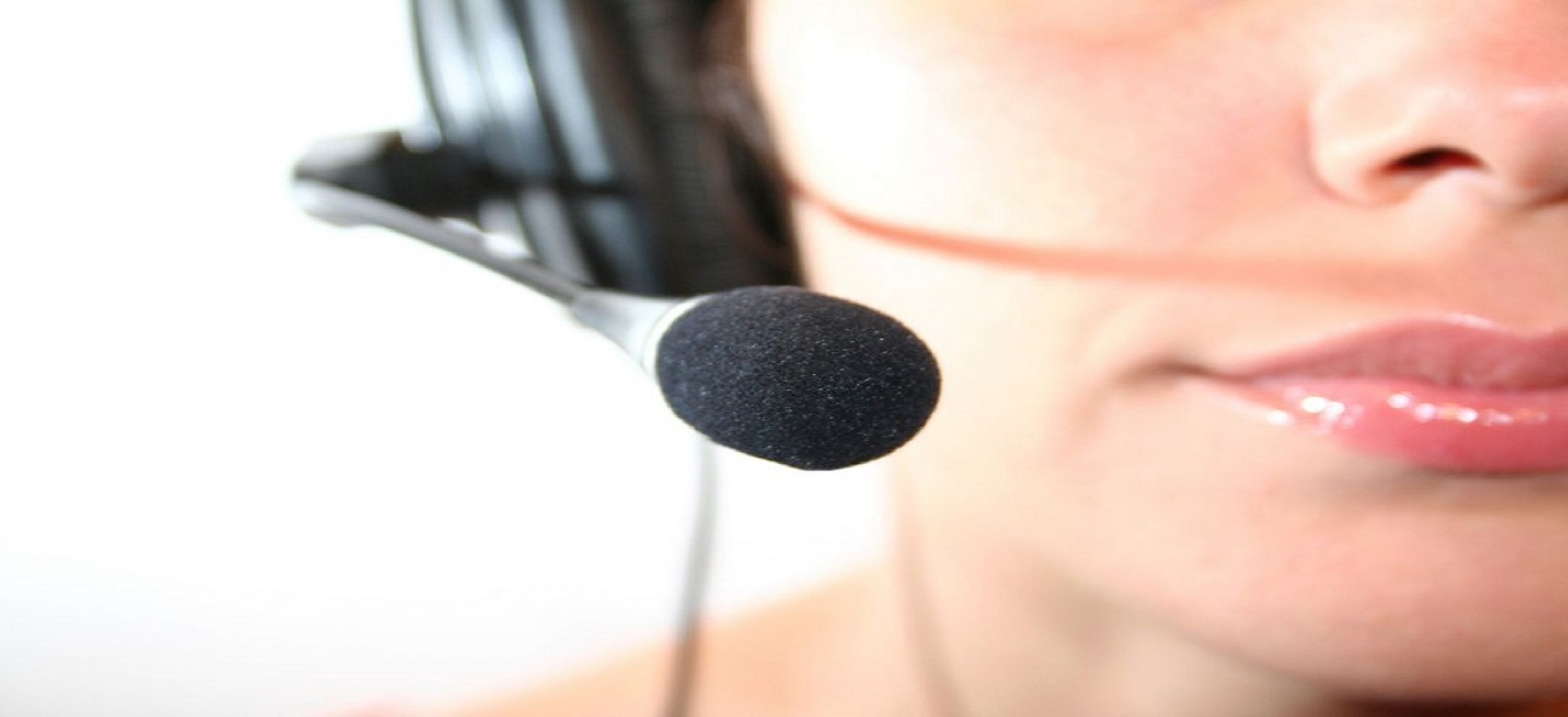
Cultural Consideration
Public Appearances
Jordan is primarily a Muslim country, although the freedom of all
religions is protected and respected. Muslim women’s clothing often covers
their legs, arms, and hair, so conservative dress is advisable for both men and
woman in the old part of Amman or in the small city and rural areas.
Nevertheless, Jordan is a country where traditional behavior and dress co-exist
easily alongside modern manners. You’ll see both Jordanians and visitors
wearing all sorts of garb, jeans or shorts and t-shirts are perfectly
acceptable attire for both men and women, especially in the most popular
tourist attractions. Please remember, though, that this is a modest culture. If
you want to feel at ease yourself and put your hosts at ease, women should
avoid wearing short shorts or tops which expose the midriff or cleavage. When
your day’s program includes visits to mosques, churches or other sacred sites,
modest attire is the most respectful.
Smoking
Smoking is very common in Jordan, however smoke-free accommodation
is available in large hotels. Many Jordanian enjoy smoking, and it’s allowed
almost anywhere and everywhere except some places, where smoking is not
allowed. While sightseeing in vehicles, you have to be patient to refrain from
smoking! Or if you are a heavy-smoker, you can ask your driver to stop over, so
you can have your cigarette. Smoking Shisha “Argeeleh- as it is called in
Arabic” is the most smoking favorite apparatus in Jordan. You will find the
Argeelah at almost every café and mots of restaurant in Jordan. Why not choose
your favorite flavor and try this interesting experience at least once!
Tipping
Tipping is usually part of the culture and in most cases leaving a
tip is good etiquette as well as showing your appreciation for the good
services you would be received, unless of course the service was really
terrible, don’t feel obliged to give a tip just because it is ‘customary’. Most
of the industries that involved in providing services, such as restaurants, pay
lower wages as they expect the employee will receive tips. Therefore, it is
quite nice of you to give a tip when you get an amazing service. In all hotels
and restaurants, you will find that a 10% service charge has been added to your
bill. This service charges goes to the whole establishment, but the lion’s
share will not be going to the people who will serve you, so you might want to
add another 5-10% for the servers. If you want to save the hassle of knowing
when and how much to tip, you can make a prior arrangement with your tour
operator to included tips in your tour price, it is customary to tip your
guide, driver, bellhops, porters, restaurants, and any other support staff
throughout the tour. Some group tour programs have a standing practice to
collect a “tipping kitty” from the members of the group. If your tour operator
does this, you should receive a written list of what amounts are being
collected and who will receive these tips. Tipping kitties will often include
tips for the hotel and airport porters, waiters, Petra horse boys and Wadi Rum
jeep drivers, and your tour driver. Tipping kitties usually do not include tips
for your tour guide. As a general guideline, your tour guide may expect a tip
of 2-3 times the amount you have designated for your driver. You should not
feel obliged to tip washroom attendants. Unlike some neighboring countries,
Jordanian government employees doing their jobs at borders, post offices,
tourist offices and other facilities neither expect nor want tips for
performing their duties. A final word of caution……you will meet charming people
everywhere you go throughout the Hashemite Kingdom of Jordan. Especially at
Petra and other major tourist sites, you may encounter children who entertain
and beguile you, offer you gifts and then ask for money. While you may be
tempted, or even want to reward the young charmers, please remember that you
make it very hard for parents to persuade their youngsters to stay in school
and get a proper education when they can run away to Petra and get money from
visitors!
Food & Drink
The Jordanian cuisine is part of the Levantine cuisine which is has
almost similar traits with the cuisine of Palestine, Syria and Lebanon with
some local variation regularly. The Jordanian cuisine is also influenced by the
cuisine of former Ottoman Empire, as well as the groups of communities who made
Jordan a home for themselves including Palestinians, Armenians, Circassians,
Iraqis, Syria, Chechens and Druze. The Jordanian cuisine relies on fresh,
locally grown vegetables and fruits. Some of the few distinct tastes and
ingredients you will be experience eating in Jordan would be freshly baked
bread, hummus, rice, lamb, yoghurt, tahini, garlic, olives, olives oil, onions,
pickles, sage, mint, and thyme. With a lavish assortment of tasty salads and
mezzah (Appetizers) served family style with diners exampling a variety of
dishes served with freshly baked bread. Hummus is very common in Jordan and it
is stable of Middle Eastern and Mediterranean cuisine. Food is an important
aspect in Jordanian culture, and is commonly used to express our generosity and
hospitality. No matter how modest their means are, the Jordanian serve family,
guests, and friends with a great honor and pride in their homes. The National
Dish of Jordan is Mansaf, and it is also a symbol in Jordanian culture for
generosity. Don not be surprised if you get invited for a homemade meal by your
guide, driver or by any local people, and that means you are expected not to
bring anything, but also try to eat everything they will prepare for you. When
you will be invited, and you have allergies, do not be shy to ask about the
ingredients as many dishes contain wheat, nuts, and rye.
Please let us know if
you are allergic to wheat and gluten, so we can provide you with the Arabic/
English Gluten Free meal card, so you can show it at any restaurant before you
order your meal. Nothing can be better than tasting the food in its native home
than anywhere else in the world, that’s why do not miss this chance to try to
taste most of Jordanian famous food while traveling throughout the Kingdom. The
table manners are an important thing to consider while traveling in Jordan as
eating with hands is very common custom, and also it indicated that you are
enjoying the offered meal. Mansaf is usually eaten with hands, and it is a
traditional way of eating this delicious meal.

Jordan Distance Chart
